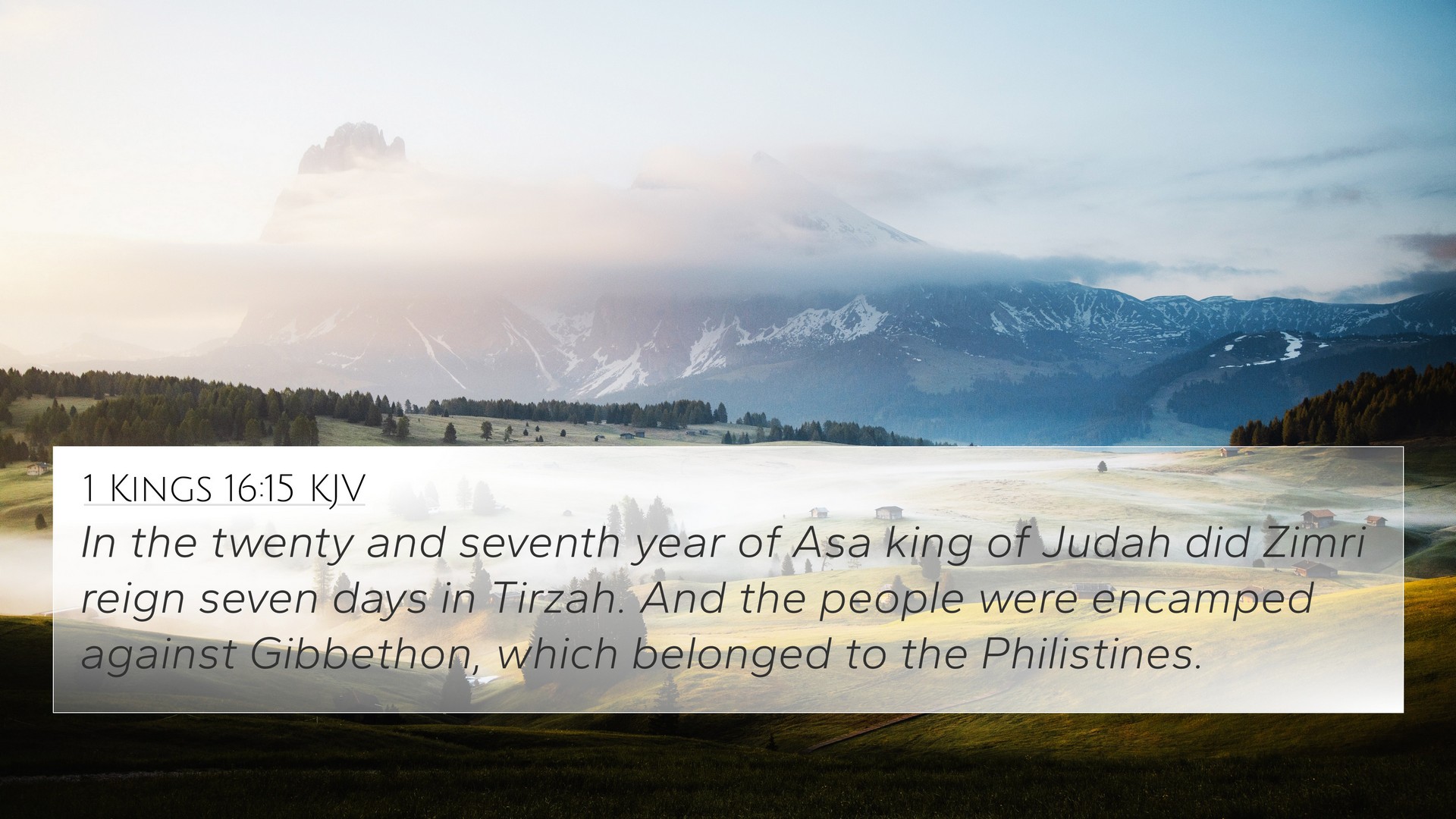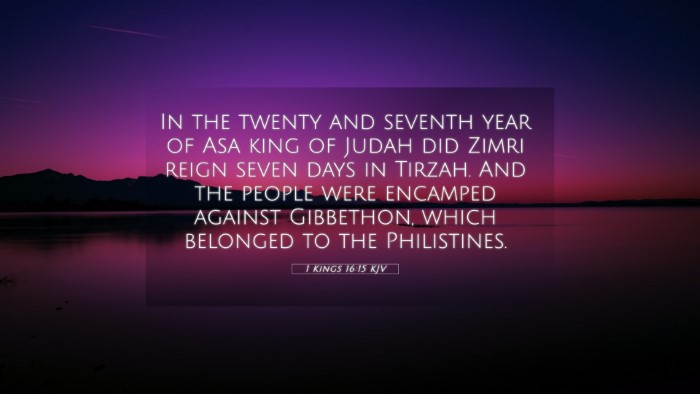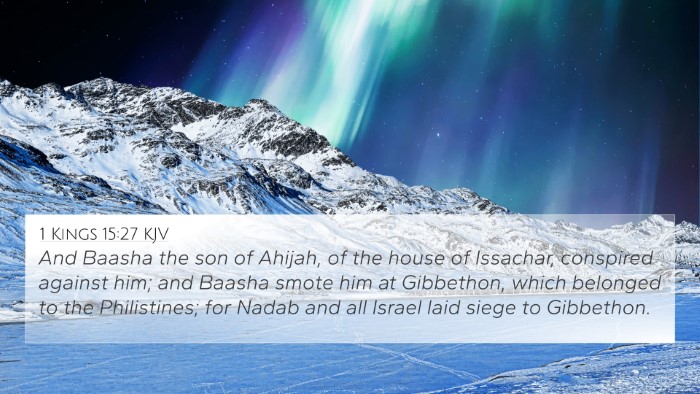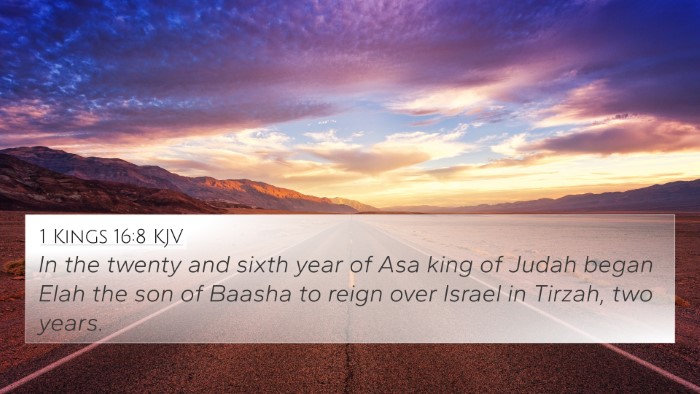Understanding 1 Kings 16:15
The verse 1 Kings 16:15 reads: "In the twenty-seventh year of Asa king of Judah, Zimri reigned seven days in Tirzah. And the people were encamped against Gibbethon, which belonged to the Philistines." This passage highlights a period of political instability and the swift rise and fall of a king in Israel's history.
Summary of 1 Kings 16:15
Zimri’s brief rule exemplifies the turbulent nature of Israel’s monarchy during this era. His quick ascent to power, followed by a rapid downfall, demonstrates the themes of divine judgment and the consequences of rebellion against God. The verse encapsulates the socio-political climate of Israel, characterized by civil strife and shifting loyalties.
Commentary Insights
Matthew Henry
Matthew Henry emphasizes the transient nature of power and authority. He reflects on Zimri's reign as a cautionary tale about the dangers of ambition and treachery, noting that his rule was cut short due to God’s sovereign will and the people's reaction. Henry suggests that this account serves to illustrate God's overarching control over earthly kingdoms.
Albert Barnes
Albert Barnes focuses on the geopolitical context, discussing the significance of Gibbethon, which belonged to the Philistines, and how the Israelites were engaged in military conflict. He portrays Zimri's reign as a product of internal strife within Israel, underscoring the disunity among the tribes and the eventual moral decay that led to divine judgment.
Adam Clarke
Adam Clarke offers a detailed analysis of the historical background of Zimri’s reign. He discusses the implications of Zimri's actions and their impact on the Northern Kingdom of Israel. Clarke highlights how Zimri's seven-day rule reflects the brevity of human ambition when not aligned with God's purposes, linking it to broader themes of idolatry and apostasy in Israel.
Thematic Connections
The verse invites exploration of key themes within the broader narrative of scripture, including the consequences of sin, the significance of leadership, and the sovereignty of God over human affairs. Here are some relevant Bible verses that connect thematically with 1 Kings 16:15:
- 2 Samuel 2:4 - David becomes king over Judah, highlighting divine selection in leadership.
- 1 Samuel 15:23 - The rebellion against God equates to the rejection of His appointed authority.
- Proverbs 21:1 - The heart of the king is in the hand of the Lord, illustrating divine control over human rulers.
- Psalm 75:7 - Promotion comes neither from the east nor the west but from God, who sets up and removes kings.
- Isaiah 40:23 - He brings princes to naught and makes the judges of the earth as vanity.
- Ezekiel 18:30-32 - Calls for repentance as a means to avoid God's judgment, resonating with the need for sincere leadership.
- James 4:10 - Humble yourselves before the Lord, and He will exalt you, contrasting earthly ambition with divine elevation.
Cross-Referencing Insights
Cross-referencing biblical texts enriches our understanding of 1 Kings 16:15. By examining similar passages, one can uncover deeper truths about God’s character and His dealings with humanity. Tools for Bible cross-referencing are invaluable for this purpose. They allow for:
- Identifying connections between Old and New Testaments.
- Finding thematic parallels that resonate across different books of the Bible.
- Examining how similar events and themes are treated across different biblical narratives.
- Understanding the character of God as demonstrated through His interactions with leaders throughout scripture.
Practical Applications
The account of Zimri invites us to consider the nature of our own ambitions and the stability we seek in leadership. We are reminded that human endeavors, particularly those driven by selfish motives, are fleeting and subject to divine evaluation. It encourages believers to align their goals with God’s will to achieve lasting significance.
Conclusion
Analyzing 1 Kings 16:15 through various lenses allows for a comprehensive understanding of its significance in biblical history. As evidenced by commentaries and cross-references, the importance of humility, divine sovereignty, and the moral responsibilities of leaders remain paramount themes. Engaging in comparative Bible verse analysis can deepen one's appreciation for the interconnectedness of scripture, offering insights that not only enhance personal faith but also encourage fruitful discourse in theological studies.









